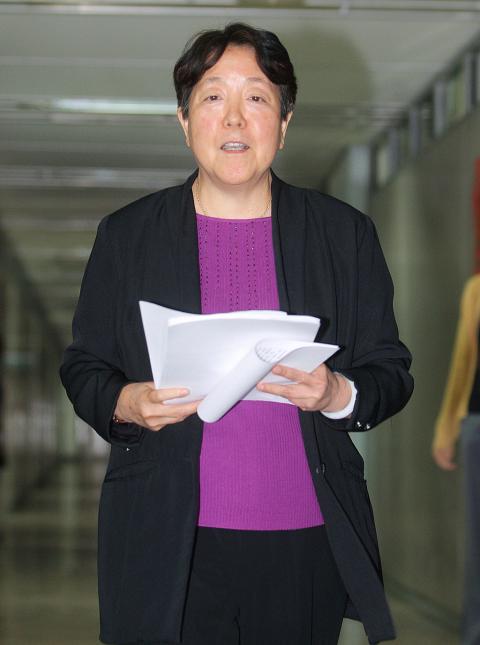Former New Party legislator Hsieh Chi-ta (謝啟大), whose employment by the Taipei City Government, allegedly to help her meet pension requirements, triggered a controversy, yesterday said she had resigned.
Hsieh made the announcement after Taipei Mayor Hau Lung-bin (郝龍斌) reproached her for traveling to China to appear on a Chinese TV talk show where she criticized the recent Sunflower movement protests at the Legislative Yuan and elsewhere in Taiwan.
Her appearance was reported in local media on Wednesday.

Photo: CNA
“I have officially tendered my resignation to Mayor Hau and hereby announce that I will not receive any pension. I will not tolerate media and politicians’ attacks on my integrity,” she told a press conference, which lasted only 30 seconds.
Last week, Taipei City councilors raised questions about the hiring of Hsieh in July last year and her promotion to senior specialist in the city government’s secretariat ahead of her 65th birthday, when she would qualify for a civil service pension because she had 22 years of civil service work before she moved to China for 10 years.
They also criticized her exemption from having to clock in and out, and from being graded according to civil servant employment standards — possible violations of the Civil Service Act (公務員服務法) — and questioned both her involvement in a lawsuit as a volunteer defense attorney and whether she also held People’s Republic of China citizenship.
Neither the Taipei City Government nor Hsieh responded to the questions, although related investigations are still ongoing.
Hsieh yesterday said that she decided to quit because she “cherished [her] reputation and dignity more than a pension.”
During the talk show, Hsieh said: “It is not true that ‘the people’ are always right.”
“Look at the recent occupation of the Legislative Yuan. Was it right? Absolutely not. There was someone behind the scenes using [the Sunflower movement],” she said.
Hau on Wednesday said her remarks were very inappropriate for a civil servant.
The mayor yesterday said Hsieh’s trip to China and appearance on the TV show had not been officially reported or approved.
“I would say this was one of the determining factors in her resignation,” he said.
In related news, former Chinese Nationalist Party (KMT) legislator Chiu Yi’s (邱毅) remarks on a Chinese political talk show during the Sunflower movement’s occupation of the legislature were criticized by Democratic Progressive Party (DPP) Legislator Tuan Yi-kang (段宜康) at a meeting of the legislature’s Interior Committee yesterday.
Tuan questioned the appropriateness of Chiu, who is a board member of state-run CPC Corp, Taiwan (台灣中油), appearing on a Chinese talk show, where he claimed the Sunflower movement was a plot by the DPP.
Tuan said Chiu had also insulted the Legislative Yuan by referring to it as “a legislative body.”
The Chinese government censors the use of “Legislative Yuan” in connection with Taiwan because it connotes a national-level institution.

CHAOS: Iranians took to the streets playing celebratory music after reports of Khamenei’s death on Saturday, while mourners also gathered in Tehran yesterday Iranian Supreme Leader Ayatollah Ali Khamenei was killed in a major attack on Iran launched by Israel and the US, throwing the future of the Islamic republic into doubt and raising the risk of regional instability. Iranian state television and the state-run IRNA news agency announced the 86-year-old’s death early yesterday. US President Donald Trump said it gave Iranians their “greatest chance” to “take back” their country. The announcements came after a joint US and Israeli aerial bombardment that targeted Iranian military and governmental sites. Trump said the “heavy and pinpoint bombing” would continue through the week or as long

TRUST: The KMT said it respected the US’ timing and considerations, and hoped it would continue to honor its commitments to helping Taiwan bolster its defenses and deterrence US President Donald Trump is delaying a multibillion-dollar arms sale to Taiwan to ensure his visit to Beijing is successful, a New York Times report said. The weapons sales package has stalled in the US Department of State, the report said, citing US officials it did not identify. The White House has told agencies not to push forward ahead of Trump’s meeting with Chinese President Xi Jinping (習近平), it said. The two last month held a phone call to discuss trade and geopolitical flashpoints ahead of the summit. Xi raised the Taiwan issue and urged the US to handle arms sales to

State-run CPC Corp, Taiwan (CPC, 台灣中油) yesterday said that it had confirmed on Saturday night with its liquefied natural gas (LNG) and crude oil suppliers that shipments are proceeding as scheduled and that domestic supplies remain unaffected. The CPC yesterday announced the gasoline and diesel prices will rise by NT$0.2 and NT$0.4 per liter, respectively, starting Monday, citing Middle East tensions and blizzards in the eastern United States. CPC also iterated it has been reducing the proportion of crude oil imports from the Middle East and diversifying its supply sources in the past few years in response to geopolitical risks, expanding

Pro-democracy media tycoon Jimmy Lai’s (黎智英) fraud conviction and prison sentence were yesterday overturned by a Hong Kong court, in a surprise legal decision that comes soon after Lai was jailed for 20 years on a separate national security charge. Judges Jeremy Poon (潘兆初), Anthea Pang (彭寶琴) and Derek Pang (彭偉昌) said in the judgement that they allowed the appeal from Lai, and another defendant in the case, to proceed, as a lower court judge had “erred.” “The Court of Appeal gave them leave to appeal against their conviction, allowed their appeals, quashed the convictions and set aside the sentences,” the judges